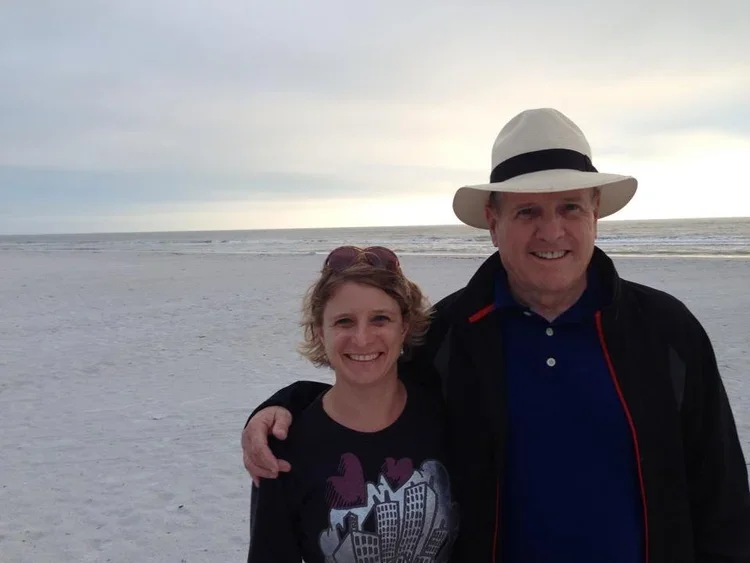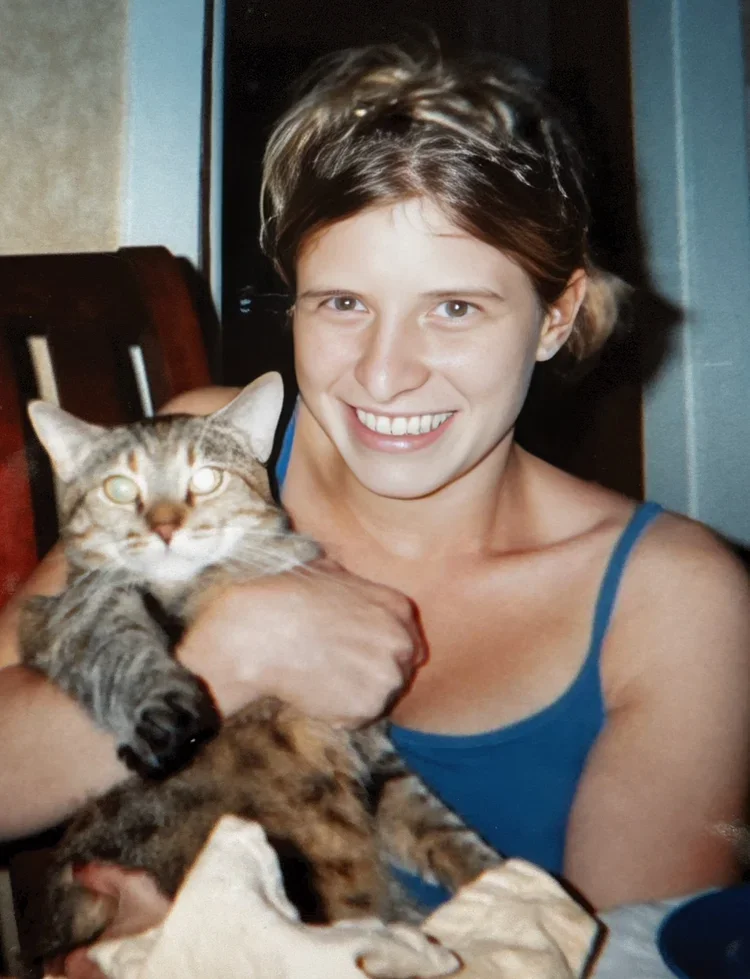Bridget O'Shea's Fight to Make Her Voice Heard
Our dear Bridget is gone. We are heartbroken.
As some people might have noticed, I've not posted over the past few weeks. I had a personal tragedy. My daughter, Bridget Ann O'Shea, died on July 14. She was 47.
We remain overwhelmed by grief, hollowed by our family's loss of a gifted and wonderful daughter. Instead of writing for the past few weeks, I traveled to Chicago with my wife Nancy to settle Bridget's affairs, an experience I hope no one who reads these pages will ever endure. I'm now ready to continue writing, though, starting with a post on Bridget, who died in her home because of an ill-understood disease that triggered cardiac arrest.
Bridget and Jim on an outing near the ocean
A journalist, poet, author, and animal rights advocate, Bridget tried several occupations over the years -- journalism, public relations, grant writing, and helping animals, as a volunteer in pet shelters and a veterinary technician.
Bridget with one of herr cats
She loved her pets. The two cats she left behind were children to her. We found a home for both, so they could be together. That would have greatly pleased Bridget.
I could relate hundreds of stories about Bridget. She made me laugh and cry as a small child who climbed every hill, fence, or mountain she faced. She grew into a beautiful, smart woman with a radiant smile, a good heart, a courageous soul, and a lively spirit.
I'm going to write more about her career as a journalist, though, because I think that's what she would want. Her legacy would make any parent proud. She stood for something, an ideal that made her shine as brightly as her blue eyes.
Bridget worked for several news organizations, including the Chicago News Cooperative, a joint venture between Chicago journalists and The New York Times. She also wrote for The Chicago Sun-Times’ Pioneer Press papers.
When financial problems engulfed journalism, I advised her to leave the field and try something else. She did, but later told me that journalism and writing were the only jobs for her. She returned to school and earned a certificate in science writing from the University of Chicago. She planned to get a job in a field elevated by the nation's experience with COVID-19.
Unfortunately, Bridget struggled to capitalize on her experience, education, and talent. In 2022. toward the end of her study at the U of C, she was struck hard by Myalgic Encephalomyelitis/Chronic Fatigue Syndrome (ME/CFS), a disabling disease. Bridget had struggled with ME/CFS off and on for years, but it roared back with a vengeance, and she took it on with a passion.
ME/CFS is a severe, long-lasting, and often debilitating illness characterized by extreme, persistent fatigue impervious to rest and recuperation. Brain fog, sensitivity to light and sound, and memory problems exacerbate ME/CFS, which primarily affects women. At one point, Bridget told me she could not wash her hair because she lacked the strength to raise her arms.
Nevertheless, Bridget started ME/CFS Evolving Awareness, a blog about the disease that gained a large following. She focused on the lack of funding for research into the possible causes of ME/CFS and the dearth of funds for potential cures. She became a respected and outraged voice for the estimated 70 million people who suffer from this disease worldwide. Organized medicine's dismissive treatment of ME/CFS and the National Institute of Health's obscene underfunding of research on ME/CFS became targets of her crusade to improve treatment and hold physicians accountable.
Adverse social consequences often plague those who suffer from ME/CFS. Bridget and others stricken by the disease usually don't look sick, despite the crippling fatigue that often confines patients to bed. Sleeping through appointments, missing dates with friends and family, and brain fog frequently lead to social exclusion, including a lack of family support.
When she first started her blog, Bridget set out to educate the public about how the disease should not be dismissed as a psychological fantasy, a flimsy diagnosis favored by many doctors.
"I am committed to educating people about ME/CFS," she wrote. "It is a physical disease with many symptoms. Diagnosis and treatment are elusive. Those of us who live with it mourn every day for our former lives that this illness has dismantled. We dream of a cure that can give us our lives back. We have become physically disabled. Because this illness is invisible, the scientific and medical communities have largely used the archaic practice of sweeping it under the rug. To this, I say Enough already."
Doctors became targets of her wrath. She acknowledged the pressures many medical professionals face in a dysfunctional health care system. But she became increasingly angry at the lack of action and impact of the disease.
"ME/CFS needs no passport," she wrote, "Like a vampire, it can live indefinitely because of the public and governmental trivialization and denial of the condition as a real, organic disease."
At times, Bridget went overboard with her anger. She castigated doctors for their apathy and lack of care. The truth is, many doctors simply didn't know what to do. The NIH, the nation's leading scientific research organization, has provided no medical foundation for research into causes and cures, leaving many physicians with little information about how to treat ME/CFS patients. However, her harsh criticism of the NIH was spot on.
Over the past ten years, the NIH has spent about $30 billion on HIV/AIDs research, a disease that affects around 13 to 14 million people worldwide. In contrast, it has spent $83 million, or less than one percent of the money spent on HIV/AIDs, over the same period for ME/CFS research, even though that disease impacts some 70 million patients, or more than four times as many people.
I'm proud of how Bridget never wavered in her determination to point out the disparity of funding and the hostile rejection of ME/CFS patients by doctors who dismissed the disease as "something in your head."
Bridget also became a vigorous voice in online chatrooms and other community forums for those suffering from ME/CFS. She noted that she was comparatively fortunate. The disease struck her later than many others.
"People with this disease tend to die early," she once told me. "But even if it gets me, I’ve had a good life. I got to go to good schools, I had a family that supported me, I went on some great trips in America and Europe, and I had fun."
As her health deteriorated more in recent months, she reluctantly agreed to leave her beloved Chicago and the friends she so valued to be near her family and a better support system.
In her final days, Bridget intensified her role as a critical and outspoken voice for the voiceless in her blog and on social media. "Thank you for using your precious little energy to write this for us, Bridget," Emily Johnson, a reader of her blog, wrote in a comment after Bridget had died. "Thank you for all you've written and done for ME/CFS patient advocacy and community care over the years. We will miss you dearly. Rest in peace."
My daughter lived and died trying to do the right thing. She even wrote an as-yet-unpublished book about her life despite her health struggles. She continued her relentless campaign to expose the shortcomings of treatment for a terrible disease.
On July 14, 2025, Bridget had planned to go out. She turned on the shower and laid down to rest. We believe she slipped away peacefully in her sleep. We became concerned when we couldn't reach her and dispatched a friend to her apartment. When she banged on the door and got no response, she called 911. They found Bridget clothed, lying on her back in her bed. She looked as though she were sleeping. The shower was still running.
—James O’Shea
James O’Shea is a longtime Chicago author and journalist who lives in North Carolina. He is the author of several books and is the former editor of the Los Angeles Times and managing editor of the Chicago Tribune. Follow Jim’s Substack, Five W’s + H here.
If you would like to help fight ME/CFS can contribute in Bridget’s name to the Solve ME/CFS Initiative by emailing development@solvecfs.org or visiting solvecfs.org

